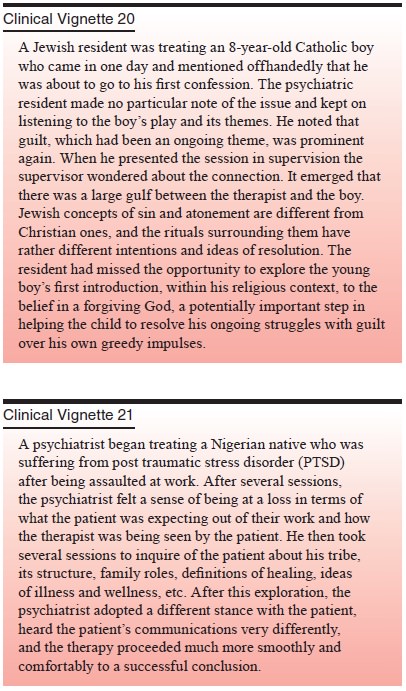Chapter: Essentials of Psychiatry: Listening to the Patient
Growing and Maturing as a Listener
Growing and
Maturing as a Listener
Transference/countertransference influence not only
relation-ships in traditional psychotherapy but also interactions be-tween all
physicians and patients and is always present as a filter or reverberator to
that which is heard. However, even the most experienced of listeners are not
always aware of the ways in which their patients’ stories are impacted by
countertrans-ference. Patients come, too, with tendencies and predisposi-tions
to experience the listener, the other person in the thera-peutic dyad, in
familiar but distorted fashion. The patient may idealize and adapt to
interpretations. She/he may be hostile and distrustful, identifying the
psychiatrist in an unconscious way with one who has been rejecting in the past.
Listening to the “flow of consciousness”, the psychiatrist discerns a thread of
continuity and purposefulness in the patient’s communica-tions. As the
psychiatrist becomes more and more familiar with his patient, he will discover
the connections between threads and the meaning will become apparent. This
awareness may come as a sign and symptom, fantasy, feeling, or fact.
There is an increasing recognition that to be a
healing listener one must be able to bear the burden of hearing what is told.
Like the patient, we fear what might be said. A patient’s story may be one of
rage in response to early childhood attach-ment ruptures or abuse, of sadness
as losses are remembered, or of terror in response to disorganization during
the experience of perceptual abnormalities accompanying psychotic breaks. The
patient’s stories invariably invoke anger, shame, guilt, ab-ject helplessness,
or sexual feelings within the listener. These feelings, unless attended to,
appreciated and understood will block the listening that is essential for
healing to take place.
Every insight is colored by what the listener has
known. It is impossible to know that which is not experienced. The
psy-chiatrist comes with his own experiences and the experiences he has had
with others. To listen in the manner we are describ-ing here is another way of
truly experiencing the world. The experiences include the imaginings of how it
must be to be 87 years old as a patient when one is a 35-year-old doctor just
fin-ishing residency; to be female when one is male; to be a child again; to
grow up African-American in a small white suburb of a large city; to be an
immigrant in a new country; to be Middle Eastern when one is Western European,
and so on. One comes to know by listening with imagination, allowing the words
of the patient to resonate with one’s own experiences or with what one has come
to know through hearing with imagination the stories of other patients or
listening to the thoughts or insights of supervisors.
The best psychiatrists continue all their
professional lives to learn how to listen better. This may be thought of not
only as a matter of mastering countertransference but of self-education. One
must learn to recognize when there are impasses in the treat-ment and to seek
education, from a colleague or, perhaps, even from the patient. Consider these
two examples.

How can the psychiatrist’s demeanor convey to the
patient that he is safe to tell his story, that the listener is one who can be
trusted to be with him, to worry with him, and serve as a helper? Much is
written about the demeanor of the psychiatrist. The air, deportment, manner, or
bearing is one of quiet anticipation – to receive that which the patient has
come to tell and share in the telling. Signals of anticipation and curiosity
may be conveyed by such statements as “I’ve thought about what you said last
time,” “How do you feel about…?” “What if…?”
Efforts of clarification often serve as bridges
between ses-sions and communicate that the listener is committed to a fuller
understanding of the patient. Patients have the need to experience the
psychiatrist as empathic. Empathy describes the feeling one has in hearing a
story which causes one to conjure up or imagine how it would have been to have
actually have had an experience oneself. How does one integrate all this so
that it is automatic but not deadened by automaticity? How does the
psychiatrist con-tinue to hear the “same old thing” with freshness and renewal?
How does one encourage the patient with consistency, clarity, and assurance in
the face of uncertainty and occasional confusion? Not by assurance that
everything will be all right when things might probably not be. Not by
attempting to talk the patient into seeing things the clinician’s way but rather
by the psychiatrist’s having the capacity to hear things his patient’s way,
from the pa-tient’s perspective.
Psychiatry is one of those rare disciplines where
the expe-rience of listening over and over again allows the listener to grow in
their capacities to hear and to heal. Hopefully, we get better and better as
the years advance, become smoother, and develop a style which blends with our
personality and training. We are renewed by the shared experiences with our
patients.
To hear stories of the human condition reminds the
psychi-atrist that he, too, is human. There is time to make discoveries in the
patient’s stories from previous times, and maybe in previous patients. Patients
will always endeavor to tell their stories. The psychiatrist continues to grow
by being the perpetual student, always with the ear for the lesson, the
remarkable life stories of his patients.
Related Topics